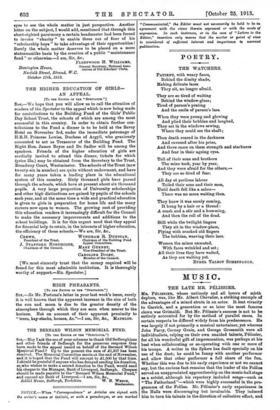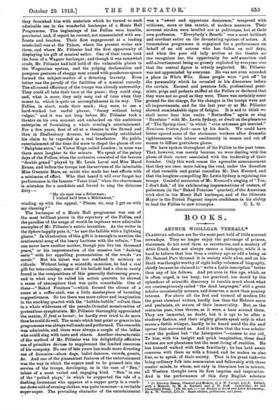M U SIC.
THE LATE MR. PELISSIER.
Ma. PELIssIEs, whose untimely end all lovers of mirth deplore, was, like Mr. Albert Chevalier, a striking example of the advantages of a mixed strain in an actor. It lent vivacity to Garrick, and a generation or so later the most famous clown was Grimaldi. But Mr. Pelissier's success is not to be entirely accounted for by the method of parallel cases. In certain respects he differed widely from his predecessors. He was largely if not primarily a musical entertainer, yet whereas John Parry, Corney Grain, and George Grossmith were all individualists, relying on their own unaided talents, Pelissier, for all his wonderful gift of impersonation, was perhaps at his best when collaborating or co-operating with one or more of his troupe. A writer in the Sphere has dealt specially on his use of the duet; he could be funny with another performer and allow that other performer a full share of the fun. Whether this was due to his early experience or not we cannot say, but the curious fact remains that the leader of the Follies served an unappreciated apprenticeship on the music-hall stage as a soloist, although his repertory. .included songs—such as "The Fatherland "—which were highly successful in the pro- gramme of the Follies. Mr. Pelissier's early experiences in the Halls were discouraging but invaluable. They induced him to turn his talents in the direction of collective effort, and
they furnished him with materials which he turned to such admirable use in the wonderful burlesque of a Music Hall Programme. The beginnings of the Follies were humble, provincial, and, if report be correct, not unassociated with sea- fronts and beaches. Their first engagement at a leading music-hall was at the Palace, where the present writer saw them, and where Mr. Pelissier had the first opportunity of displaying his gift of musical satire. One of their turns took the form of a Wagner burlesque; and though it was somewhat crude, Mr. Pelissier had laid hold of the vulnerable places in the Wagnerian system, and the yelping declamation and pompous gestures of shaggy men armed with ponderous spears formed the subject-matter of a diverting travesty. Even better was the parody of the futilities of a musical comedy. The all-round efficiency of the troupe was already noteworthy. They could all take their turn at the piano ; they could sing, and, what is more, they only sang out of tune when they meant to, which is quite an accomplishment in its way. The Follies, in short, made their mark ; they were, to use a bard-worked but useful phrase, " funny without being vulgar," and it was not long before Mr. Pelissier took a theatre on his own account and embarked on the ambitious enterprise of furnishing a whole evening's entertainment. For a few years, first of all at a theatre in the Strand and then in Shaftesbury Avenue, he triumphantly established his claim to be regarded as a real benefactor. No public entertainment of the time did more to dispel the gloom of our "Babylon noire," as Victor Hugo called London ; in none was there more laughter to the minute. We speak of the palmy days of the Follies, when the orchestra consisted of the famous "double grand" played by Mr. Louis Laval and Miss Maud Evans, and before the troupe lost the services of the inimitable Miss Gwennie Mars, an artist who made her best effects with a minimum of effort. Who that heard it will ever forget her performance in the famous " Voice trial," when the charwoman is mistaken for a candidate and forced to sing the dolorous ditty:— "My ole man was a fisherman ; I wished he'd been a Militiaman," winding up with the appeal, " Please, sir, may I get on with my cleaning ?"
The burlesque of a Music Hall programme was one of the most brilliant pieces in the repertory of the Follies, and the parodies of the songs of would-be ingénues were admirable examples of Mr. Pelissier's satiric invention. As the writer in the Sphere happily puts it, " be saw the fallible with a lightning glance." In illustration of this gift it is enough to mention the sentimental song of the heavy baritone with the refrain, "Yon can never have another mother, though you live ten thousand years," or his impersonation of the massive but " dashing serio " with her appalling pronunciation of the words "au revoir." But his talent was not confined to mimicry or ridicule. Without being a scientific musician, he had a real gift for tune-coining; some of his ballads had a charm rarely found in the compositions of this generally distressing genre; and in what may be called his action quartets he showed a sense of atmosphere that was quite remarkable. One of these—" Baked Potatoes "—which formed the climax of a scene at a coffee-stall, was a little masterpiece of haunting suggestiveness. So too there was more colour and imagination in the smoking quartet with the "bubble-bubble" refrain than in a whole wilderness of the pseudo-Oriental monstrosities of pretentious symphoniste. Mr. Pelissier thoroughly appreciated the maxim, Il foul se bonier; he hardly ever tried to do more than he could do well. The music which lent point or grace to his programmes was always well made and performed. The ensemble was admirable, and there were always a couple of the ladies who could sing with taste and charm. Another characteristic of the method of Mr. Pelissier was his delightfully effective use of primitive devices to supplement the limited resources of his company. No one of late years has made more diverting use of dummies—sham dogs, ballet-dancers, crowds, guests, &c. And one of the pleasantest features of the entertainment was the way in which the supers used to be pressed into the service of the troupe, developing, as in the case of " Ben," talent of a moat varied and engaging kind. " Ben," in one of the "potted plays," in which he supported the role of a dashing lieutenant who appears at a supper party in a reach- me-down snit of evening clothes, was quite immense—a veritable super-super. The prevailing character of the entertainment was a "sweet and opportune desipience," tempered with. criticism, more or less caustic, of modern manners. Their severest strokes were levelled not at politicians, but at their own profession. "Everybody's Benefit" was a most brilliant and mordant satire on the devastating egotism of actors. A tremendous programme is organized for a performance on. behalf of an old actress who has fallen on evil days, and when the poor old lady arrives at the theatre no one recognizes her, the opportunity for self-assertion and self-advertisement being so grossly exploited by everyone else that the central figure is utterly neglected. Mr. Pelissier was not appreciated by everyone. He was not even accorded a place in Who's Who. Some people were " put off " by the personality which he revealed in his discourses before the curtain. Earnest and precious folk, professional pessi- mists, prigs and pedants sniffed at the Follies or declared that they were not so good as they were. There was certainly some ground for the charge, for the changes in the troupe were not all improvements, and for the last year or so Mr. Pelissien showed unmistakable signs of fatigue. It is sad to think we shall never hear him recite "Butterflies" again or sing " Excelsior " with Mr. Lewis Sydney, or dwell on the pleasures of "The Spring-time," in which "even actresses get married." Neminem ti-lam fecal—save by his death. We could have better spared some of the strenuous workers after dramatic righteousness who labour assiduously in season and out of season to diffuse gratuitous gloom.
We have spoken throughout of the Follies in the past tense. That, however, was merely because we were dealing with the phase of their career associated with the leadership of their founder. Only this week comes the agreeable announcement that they are once more taking the road, under the direction of that versatile and genial comedian Mr. Dan Everard, an& that the laughter-compelling Mr. Lewis Sydney is rejoining the troupe. Grateful memories of Mr. Everard's singing of " Yus, I don't fink," of his exhilarating impersonations of costers, of policemen (in the "Baked Potatoes " quartet), of the American trick shot in the Music Hall burlesque, and of the illiterate Mayor in the Potted Pageant inspire confidence in his ability to lead the Follies to new triumphs. C. L. G.















































 Previous page
Previous page